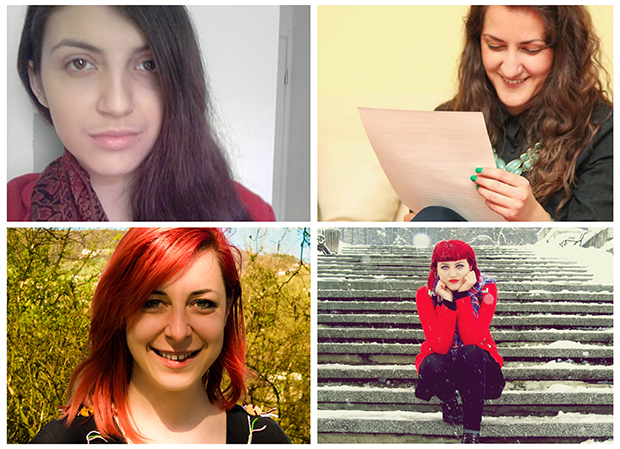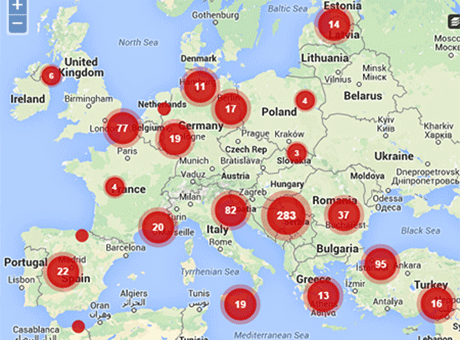Index relies entirely on the support of donors and readers to do its work.
Help us keep amplifying censored voices today.

Sara, Nataša, Elma and Lejla (clockwise, from top left) are local correspondents for Balkan Diskurs.
At first glance it’s easy to mistake Bosnia and Herzegovina’s media landscape as one of promise. With a constitution that guarantees freedom of the press, a large number of media outlets, and a financially independent regulatory body, the small Balkan country performs relatively well by Southeast European standards.
But on closer inspection such freedoms are a mere façade, hiding this divided, post-war state’s continued struggle with a highly polarised and politicised media. Despite appearances, many of the fundamental aspects of media freedom face significant challenges and, according to recent reports, the situation is only worsening.
Lejla, Nataša, Sara and Elma live their lives within this decline. All in their early to mid-twenties, they represent a generation that had little to do with the war but that bears the burdens of its legacy nonetheless. All four are full-time students, but in their spare time, they’re working towards a fairer, freer future across Bosnia as local correspondents for Balkan Diskurs – a non-profit platform created and run by a regional network of journalists, artists and activists, dedicated to providing objective news (full disclosure: the author of this article works with Balkan Diskurs).
“The media is in the hands of the government. Certain persons dictate which news to publish, how much, and so on,” explains Nataša, from Bijeljina, the second largest city in predominantly Bosnian Serb Republika Srpska, one of the country’s two constituent entities. Sara, from Jajce, confirms that her impression of media within her entity, the predominantly Bosniak and Bosnian Croat Federation of Bosnia and Herzegovina, is the same: “They should be working for public benefit, [but] they are mostly just an arm of parties and political elites.”
Such criticisms will come as little surprise to those who have been tracking the state of media freedom in Bosnia. Index on Censorship’s Mapping Media Freedom project, Freedom House and Reporters Without Borders have pointed to mounting levels of political pressure and media partisanship. Such pressure takes a variety of forms, but largely stems from the country’s ongoing ethnic and political cleavages. Many media outlets, including Bosnia’s three public broadcasters, are organised along ethnic lines, while some are either aligned, openly affiliated or funded by specific political parties or figures.
As a consequence, skewed media coverage is commonplace and corruption and crime often goes unreported. As Lejla explains: “Many things happening in Visoko are never reported in media, for reasons unknown to me, and those are not small things either – for example there were multiple shootings last month and very little was written about it.”
Media bias, she added, “is most obvious though when political topics from the Federation and Republika Srpska are compared”.
The International Criminal Tribunal for the former Yugoslavia (ICTY) is a regular victim of such political bias. Much of the local media coverage of the tribunal is skewed and selective. For example, during the closing days of the case against Radovan Karadžić, the Sarajevo-based Dnevni Avaz focused on the prosecution’s charges against the former Bosnian Serb politician, while Banja Luka-based Nezavisne Novine focused solely on his defense and protestations of innocence. Furthermore, only “a handful” of independent organisations in Republika Srpska are known to report on trials within Bosnia’s local War Crimes Court.
Equally as worrying is the fate of those who resist such political pressures. It is not uncommon for journalists and media outlets in both of Bosnia’s entities to face harassment from political, religious and business leaders. Last December, Republika Srpska’s anti-corruption police raided the Sarajevo headquarters of Klix.ba with the aim of identifying the source of a recording published on the news site. Nor are Bosnia’s regulatory agencies immune, as demonstrated by a spate of unidentified attacks against the country’s press council in 2014.

Index report: Europe’s journalists face growing climate of fear
Political pressure is not the only threat to media in freedom in Bosnia. The country’s deteriorating economic situation also presents serious challenges. “Journalists sell their names for trinkets, I guess due to lack of other options or because they are used to taking the easy way out,” Elma explains. “I have witnessed various manipulations by local ‘wannabe journalists’ who publish every single piece of information that lands in their inbox without checking it, not being aware of the consequences,” she adds.
This thoughtless reproduction of news frequently leads to the rapid spread of false information, as demonstrated by the whirlwind of stories surrounding Bosnia’s protests last spring. This phenomenon is only exacerbated by a strong culture of social media use and low levels of media literacy. “The problem is anyone who has internet access can start their own portal or a Facebook page where they will write whatever they want in anyway they see fit… and many people lack critical thinking,” says Elma.
This sad truth has a silver lining though, and it is one all four women subscribe to through their work with Balkan Diskurs and within their local communities: Bosnia’s citizens also have the potential to change the media landscape. “Thinking with your own head and not being a sponge that soaks up everything that is offered [is important],” claims Elma.
Meanwhile her colleagues underline the promise of independent media in terms of media freedom. “Balkan Diskurs gives my voice an opportunity to be heard, so that stories that others keep quiet about can be told; to present my town in a different, more real light. That opportunity, for me, is priceless,” concludes Lejla.
Balkan Diskurs is a non-profit, multimedia platform created and run by a regional network of journalists, bloggers, multimedia artists, and activists who came together in response to the lack of objective, relevant, invigorating, independent media in the Western Balkans. In partnership with Index on Censorship, the site is supporting efforts to map the state of media freedom in Europe.
World Press Freedom Day 2015
• Media freedom in Europe needs action more than words
• Dunja Mijatović: The good fight must continue
• Mass surveillance: Journalists confront the moment of hesitation
• The women challenging Bosnia’s divided media
• World Press Freedom Day: Call to protect freedom of expression
This article was posted on 27 April 2015 at indexoncensorship.org